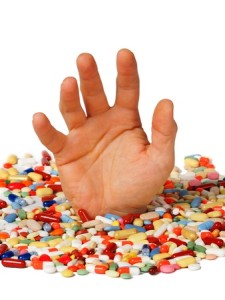I told Allison to concentrate on my voice and imitate how I was breathing. My coworker held her head in her lap. Together we kept Allison focused until the paramedics came. Determined to stop all drug use after she came into outpatient drug and alcohol treatment, she decided to stop taking her Paxil … cold turkey. The result was a severe panic attack and ER visit.
The Center for Disease Control and Prevention (CDC) estimated that eleven percent of Americans 12 and over use antidepressants. More than 60% of those taking an antidepressant medication have taken it for 2 years or longer; 14% have taken the medication for 10 years or more. Like Allison, women between the ages of 40 and 59 are those most likely to be taking an antidepressant (22.8%). Antidepressants were the most commonly used medication by persons aged 18-44; they were the third most commonly used prescription drug by all Americans in 2005-2008.
Okay, you’re thinking you want to try to withdraw from antidepressants; but you don’t want to duplicate Allison’s experience. What should you do?
First, do some research on the growing evidence of problems with antidepressants.
Look at some of the material available on the websites “ToxicPsychiatry” by Peter Breggin and PsychRights by Jim Gottstein. Here are a few recommendations.
Start with Patient Online Report of Selective Serotonin Reuptake Inhibitor-Induced Persistent Postwithdrawal Anxiety and Mood Disorders, by Carlotta Belaise, Alessia Gatti, Virginie-Anne Chouinard, and Guy Chouinard,on Psychrights. It is a short, easy to read study of online self-reports of withdrawal symptoms and postwithdrawal symptoms that they attributed to the discontinuation of SSRI antidepressants.
Then read “Do Antidepressants Cure or Create Abnormal Brain States?” by Joanna Moncrieff, found on ToxicPsychiatry. If you want further information, try her book, The Myth of the Chemical Cure. Dr. Moncrieff effectively challenges the received wisdom of the chemical imbalance theories underlying the use medications for depression, psychosis and bipolar disorder.
If you have used antidepressants for a number of years, also read: “Now Antidepressant-induced Chronic Depression Has a Name: Tardive Dysphoria,” by Robert Whitaker. Try out his website as well, Mad in America.
You can also read two articles that I’ve written and made available here on Faith Seeking Understanding: “Antidepressant Withdrawal or Discontinuation Syndrome?” and “Antidepressants Their Ineffectiveness and Risks.”
Second, become familiar with the potential postwithdrawal side effects of antidepressant withdrawal.
There is a website of free resources at RxISK. You can research reported side effects by drug name; and you can report a drug’s side effects. But be sure to look at the “Symptoms-on-Stopping Zone.” Read about the concept of medication spellbinding coined by Peter Breggin on his ToxicPsychiatry site. Try his article, “Intoxication Anosognosia: The Spellbinding Effect of Psychiatric Drugs” or his book, Medication Madness for a more detailed discussion.
Mario Fava has developed a scale to assess withdrawal/discontinuation symptoms during an antidepressant taper. You can see a copy of his DESS Scale here; and read about antidepressant discontinuation here. You can download the original Fava article here after registering with psychiatrist.com.
Finally, don’t try this at home alone.
Read this blog post on Mad in America by Monica Cassani. Locate psychiatric support groups and websites like Beyond Meds by Monica Cassani. RxISK has published a detailed “Guide to Stopping Antidepressants.” Also read Your Drug May Be Your Problem: How and Why to Stop Taking Psychiatric Medications or Psychiatric Drug Withdrawal, both by Peter Breggin.
Make sure you have medical support and monitoring from a doctor or psychiatrist who is supportive of your attempt to taper. Someone who is president of the local chapter of NAMI and believes in the chemical imbalance theory of depression is not a good choice to supervise your drug taper. Postwithdrawal symptoms will be seen as the re-emergence of your underlying psychiatric disorder and proof you need to be on medications for life.
Tell family and friends of your decision and enlist them (those who are receptive to your decision to taper) as members of an accountability or support group. Have them read this material.
In closing, remember this warning by Dr. Peter Breggin on his website:
Most psychiatric drugs can cause withdrawal reactions, sometimes including life-threatening emotional and physical withdrawal problems. In short, it is not only dangerous to start taking psychiatric drugs, it can also be dangerous to stop them. Withdrawal from psychiatric drugs should be done carefully under experienced clinical supervision.

